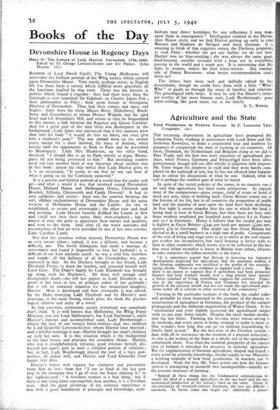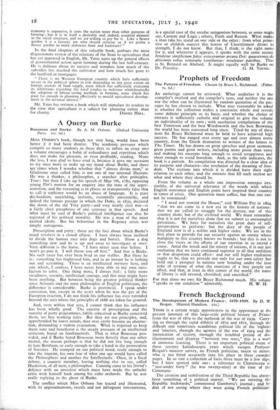Agriculture and the State
Food Production in Western Europe. By P. Lamartine Yates. (Longmans. Is.) THE recurring depressions in agriculture have prompted Mr. Lamartine Yates, working in association with Lord Astor and Mr. Seebohm Rowntree, to make a continental tour and examine for purposes of comparison the state of farming in six countries. Of
these, Denmark, the Netherlands and Belgium clung as we did to Free Trade, and the first two were exporters of agricultural pro- duce, while France, Germany and SwitzerlaRd have been ultra- protectionist, though still not able wholly to dispense with imports. Mr. Yates began his journeys in 1938 and they were barely com- pleted on the outbreak of war, but he has not allowed later happen- ings to colour his discussions of what he saw. Indeed, what he saw is perhaps the smallest part of what he learnt.
In spite of the varied policies of the states, in no country can it be said that agriculture has been made prosperous. As regards most of the comparisons—gross output, yield of crops or head of stock per acre, value of farming land—Great Britain comes out at the bottom of the list, but in all countries the proportion of arable land and the number of men upon the land have been declining. At first sight it seems singular that the rate at which the land is losing men is least in Great Britain, but then there are here only three workers employed per hundred acres against 8.5 in France and 12.7 in Germany. Hence it follows that the output per man is highest in Great Britain—£24o per head per annum (L200 net), against £70 in Germany. One might say that Great Britain has elected to do a small business at a high rate of profit. Comparisons of the cost of living and wage rates so as to -arrive at the real returns per worker are inconclusive, but rural housing is better with us than in other countries. which seems also to be reflected in the fact that rural infant mortality is lower in Britain than urban, whereas in other countries the urban mortality is the lower.
"It is sometimes argued that Britain in pursuing her industrial development neglected her agriculture, that the economic welfare of the farming community was sacrificed to the profits of the manufac- turing classes. There is no evidence to support such a view. . . . But there is no reason to suppose that if agriculture had been protected, farmers and farm workers would, over a long period, have enjoyed a better standard of living; everything suggests the contrary. Protec- tion in the experience of France and Germany has retarded the growth of the national wealth and has not made the agricultural popu- lation better off in relation to other sections of the community."
Turning to the particular sections of the book, the reader today will probably be most interested in the accounts of the drastic re- construction of agriculture in Germany, the product of the cultural propaganda and the elaborate organisation of Walter Darre. It has "maintained and even slightly increased the agricultural output with to per cent. fewer hands. Despite the rural exodus produc- tion has not fallen. Farming has become more labour-saving in its methods, and every nerve is being strained to make it more so. One wonders how long this can go on without jeopardising the family farm system." But the key-note of the German system is that, with all its insistence on the creation of a peasant aristocracy, its aim is the welfare of the State as a whole, not of the agricultural community alone. Too often the material prosperity of the current race of farmers is mistaken for progress in national agriculture. But the regimentation of German agriculture, shaped and tested at every point by scientific knowledge, should supply to our Ministries a working example of how food production in wartime can be developed. None the less, Mr. Yates points out how the German system is attempting to reconcile two incompatibles—autarky and the peasant structure of farming : "Behind all these things lies the fundamental contradiction be- tween the ideal of a peasant agriculture on the one hand and the most economical production of the nation's food on the other. Given th:- circumstances of twentieth-century Germany, the two are difficult t) reconcile. In better times one might say : admittedly a peasan: economy is expensive, it costs the nation more than other patterns of farming ; but it is in itself a desirable and, indeed, essential element in the social structure, and we are willing to pay for it. Like a flower garden it is a luxury; yet who should criticise us if we prefer a flower garden to more elaborate food and furniture? "
In the final chapters of this valuable book, perhaps the most dispassionate review of the relations of the State to agriculture that has yet appeared in English, Mr. Yates sums up the general effects of governmental action upon farming during the last half-century. He is dubious about its success and wonders how much of the subsidies has reached the cultivator and how much has gone to the landlord or mortgagee.
"There is no Western European country which feels sufficiently secure in the political sphere to risk depending to any great extent on foreign sources of food supply, none which has sufficiently overcome its inhibitions regarding the rural exodus to welcome wholeheartedly the adoption of labour-saving methods in farming, none which has gone far enough in planning effectively to mould agricultural develop- ment in the national interest."
• Mr. Yates has written a book which will stimulate its readers to the view that agriculture is a subject for planning rather than































 Previous page
Previous page